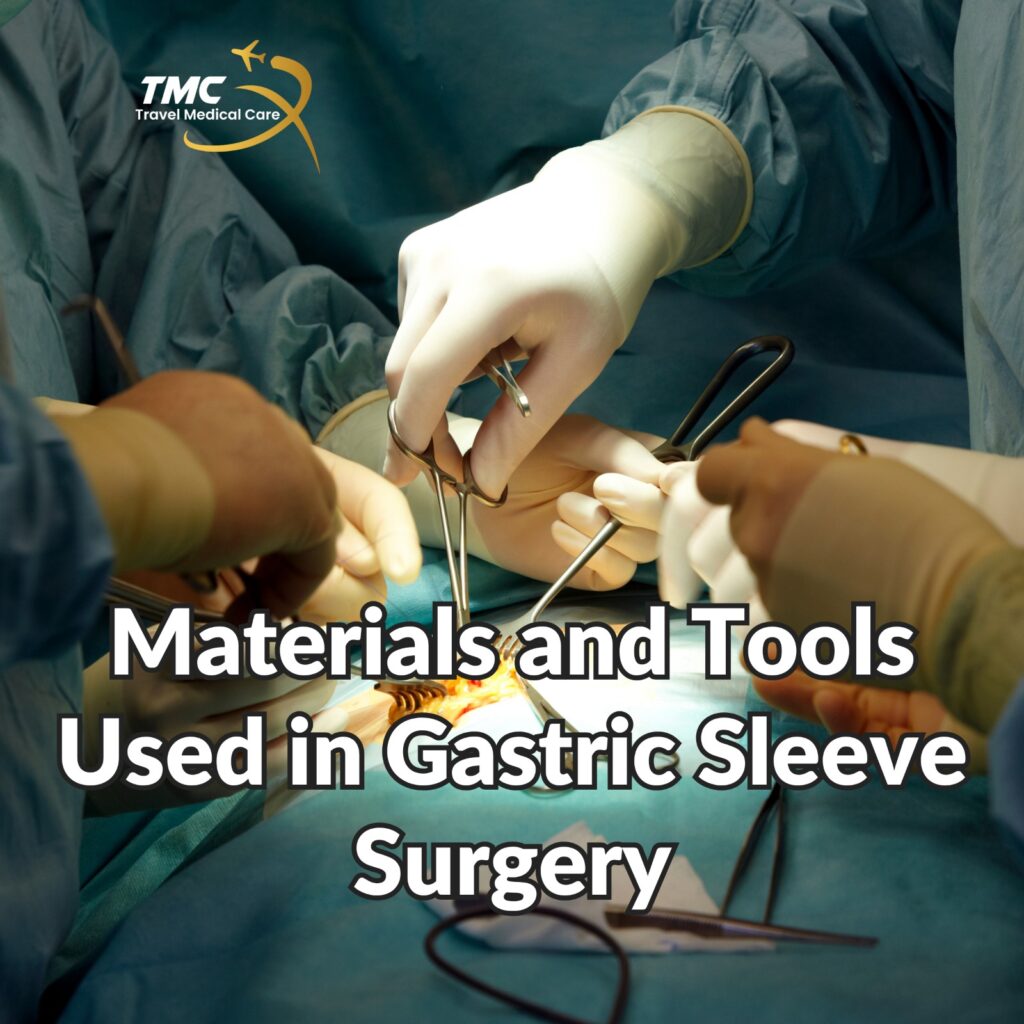In the world of surgery where fingers dance across the strings of life tools emerge as silent heroes, weaving a new tale of healing through threads of technology. The instruments used in gastric sleeve surgery are not merely tools; they are bridges between pain and hope, between the unknown and certainty. From corrosion-resistant stainless steel to lightweight titanium that mirrors a surgeon’s precision, these materials pulse with vitality, restoring patients’ sense of freedom and comfort. Every tool, every material, tells a story of science and innovation one of continuous care and advancement. This journey begins with the very elements that form the foundation of healing, and with TMC’s support, that journey becomes more refined and secure where science blends with compassion and hope is forged.
These materials are not coincidental they are the outcome of meticulous scientific research and continuous development. Crafted to interact with the human body without harm, they withstand the internal challenges of the body while supporting the surgeon every step of the way. Each piece of stainless steel, each titanium strip, and each medical-grade plastic texture carries a promise: to make the operation safer, more effective, and more compassionate for those seeking a new chance to move, breathe, and smile.

Thanks to these tools, the journey of gastric sleeve surgery transforms from a mere medical procedure into a form of art one that redraws the map of life and nurtures the most beautiful trees of hope in the garden of health. Be part of this story a story that redefines healing with TMC as your trusted companion, always choosing the best for you.
Materials and Tools Used in Gastric Sleeve Surgery: Types and Importance
Gastric sleeve surgery heavily depends on specialized tools made from high-quality materials to ensure accuracy and safety throughout the procedure. These tools differ in the materials they’re made of and their mechanisms of action, with each playing a crucial role in the operation’s success and the patient’s safety. Below, we explore the most important types of materials used in these tools, along with the latest innovations enhancing surgical performance and minimizing risks.
1. Stainless Steel
Stainless steel is the most commonly used metal in surgical tools due to its perfect balance of strength, durability, and corrosion resistance. In the body’s warm and moist environment, stainless steel tools remain rust-free and intact a critical factor considering repeated sterilization. Moreover, stainless steel maintains sharp cutting edges for scissors and staplers, enabling precise and clean tissue cuts, thereby reducing collateral tissue damage.
2. Titanium
Titanium is particularly used in parts of surgical tools that require lightweight strength. It is also ideal for implants such as surgical screws and pins, thanks to its hypoallergenic nature and long-term resistance to corrosion. Titanium offers surgeons greater control due to its light weight, which reduces hand fatigue during surgery and ensures reliability in the body’s complex environment.
3. Medical Polymers
Medical-grade polymers such as polypropylene and polyurethane offer unique flexibility and high chemical safety, making them excellent for tool components that require movement or a secure grip. These materials are used in tool handles to ensure a firm, non-slip hold during surgery and in suction tubes that need to flex and navigate within the body. Additionally, they resist sterilization chemicals, maintaining safety through multiple uses.
4. Special Alloys and Coating Technologies
Some precision tools are made from specially engineered metal alloys that offer a balance of flexibility and strength, along with enhanced resistance to heat and corrosion. Advanced coatings such as carbon, gold, or ceramic layers not only improve corrosion resistance but also reduce bacterial and contaminant buildup on metallic surfaces, increasing safety and extending the tool’s lifespan.
5. Medical Glass and Optical Components
Lenses and optical tubes in surgical scopes are made from high-quality glass with anti-reflective and scratch-resistant coatings to enhance image clarity and reduce light loss. Surgical vision quality depends heavily on these materials, as they provide detailed, real-time images that help the surgeon accurately identify anatomical structures and make quick, informed decisions during surgery.
6. Advanced Energy Tools
Laser devices, ultrasound scalpels, and electrocautery machines use cutting-edge energy technologies to perform precise, efficient tissue cuts while controlling bleeding. These tools are built with heat-resistant materials to maintain consistent performance while minimizing thermal damage to surrounding tissues. This helps reduce post-op inflammation, pain, and speeds up recovery.
7. Sterilization and Disinfection
Sterilizing tools is the cornerstone of any safe surgical procedure. Modern sterilization equipment, such as autoclaves (which use high-pressure steam) and gas sterilizers (like ethylene oxide systems), ensure complete elimination of germs and bacteria while preserving tool integrity. This protects the patient from post-operative infections and guarantees the durability of the tools.
8. Support Instruments
These include fine instruments such as various types of forceps, scissors, and retractors that help the surgeon grip, stretch, and move tissues accurately during surgery. Made from durable, lightweight materials, they reduce surgeon hand fatigue and enable high-precision handling. These tools are essential for successful procedures, allowing access to delicate internal areas and supporting efficient surgical steps.
9. Latest Innovations in Bariatric Tools and Materials
- Reconfigurable Staplers: Designed to allow angle and grip adjustments during surgery, these staplers improve anatomical fit and reduce leakage or bleeding risks.
- Robotic Scopes: Combining advanced control systems with 3D visualization, these scopes offer precise, stable tool handling, minimizing error and enhancing surgical quality.
- Smart Monitoring Devices: AI powered devices analyze live vital signs and automatically alert the medical team of abnormal changes, allowing rapid response and reducing risk.
TMC’s Role in Providing Premium Tools and Technology
TMC ensures that its clients receive the best treatment experience by partnering with world-class hospitals and medical centers equipped with the most advanced and high quality gastric sleeve tools and materials. These institutions rely on superior-grade components that ensure surgical precision and safety, increasing the success rate and reducing complications.
TMC provides an integrated care environment that includes:
- Advanced Medical Tools: Utilizing the latest surgical staplers, scopes, and energy devices that meet the highest standards of quality and safety.
- Expert Medical Team: Comprised of specialized bariatric surgeons, nutritionists, and psychiatrists offering full spectrum care throughout the treatment journey.
- Complete Logistical Support: Includes airport pickup, VIP transport in comfortable air-conditioned vehicles, premium hotel stays near hospitals, and accurate coordination of appointments and medical tests.
Contact TMC
For a free consultation or to book your treatment journey with top experts and the latest technology:
- Phone: +201101000733
- Email: info@tmc.eg
Gastric sleeve surgery tools and materials are the beating heart of the operation they transform surgical skill into real health outcomes. With continuous advancements in materials and technology, it is now possible to achieve safer, more precise results with fewer complications. Trust that choosing high-quality tools, along with TMC’s expert support, is your best step toward a healthier, lighter life.
